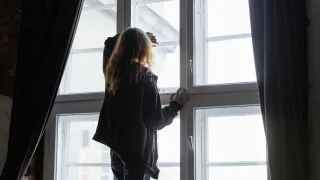
How Your Self-Concept Shapes Healing After Toxic Relationships
Your self-concept determines how you respond to challenges. Learn how changing how you see yourself transforms your healing and life. ...more
Healing & Growth
October 28, 2025•3 min read

Boundaries and Narcissists: Why They Don’t Work the Way You Think
Boundaries alone don’t protect you from narcissists. Learn why and what trauma-informed healing looks like for real protection. ...more
Healing & Growth
September 24, 2025•2 min read

What Does Healing from Narcissistic Abuse Look Like? 7 Signs You’re Truly Moving Forward
Learn 7 clear signs of healing from narcissistic abuse. Understand what progress looks like and how to keep moving forward. ...more
Healing & Growth
September 08, 2025•3 min read

Breaking the Cycle: How to Stop Obsessing Over Someone Who Hurt You
Struggling to stop obsessing over a toxic person? Learn trauma-informed steps to break the cycle, heal, and reclaim your peace. ...more
Healing & Growth
August 25, 2025•3 min read

Healing After Toxic Relationships: How Coaching Empowers Professional Women to Reclaim Their Power
Break free from toxic relationships and rebuild your power. Discover how coaching helps professional women heal emotional abuse and thrive personally and professionally. ...more
Healing & Growth
August 17, 2025•5 min read

When Your Ex Moves On: How to Handle It Without Losing Yourself
Discover how to cope when your ex moves on. Learn practical tips to process emotions, protect your self-worth, and focus on your growth so you can move forward with strength and confidence. ...more
Healing & Growth
December 09, 2024•5 min read
How Your Self-Concept Shapes Healing After Toxic Relationships
Your self-concept determines how you respond to challenges. Learn how changing how you see yourself transforms your healing and life. ...more
Healing & Growth
October 28, 2025•3 min read

Boundaries and Narcissists: Why They Don’t Work the Way You Think
Boundaries alone don’t protect you from narcissists. Learn why and what trauma-informed healing looks like for real protection. ...more
Healing & Growth
September 24, 2025•2 min read

What Does Healing from Narcissistic Abuse Look Like? 7 Signs You’re Truly Moving Forward
Learn 7 clear signs of healing from narcissistic abuse. Understand what progress looks like and how to keep moving forward. ...more
Healing & Growth
September 08, 2025•3 min read

Breaking the Cycle: How to Stop Obsessing Over Someone Who Hurt You
Struggling to stop obsessing over a toxic person? Learn trauma-informed steps to break the cycle, heal, and reclaim your peace. ...more
Healing & Growth
August 25, 2025•3 min read

Healing After Toxic Relationships: How Coaching Empowers Professional Women to Reclaim Their Power
Break free from toxic relationships and rebuild your power. Discover how coaching helps professional women heal emotional abuse and thrive personally and professionally. ...more
Healing & Growth
August 17, 2025•5 min read

When Your Ex Moves On: How to Handle It Without Losing Yourself
Discover how to cope when your ex moves on. Learn practical tips to process emotions, protect your self-worth, and focus on your growth so you can move forward with strength and confidence. ...more
Healing & Growth
December 09, 2024•5 min read

